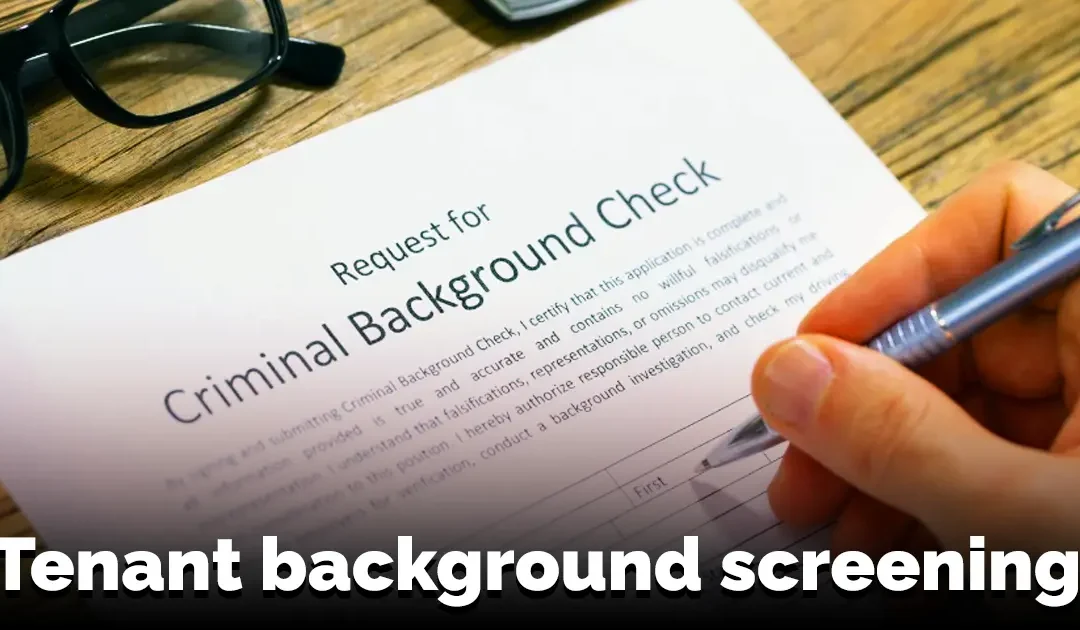Trusting absolute strangers with one’s property can only be described as a leap of faith. Then, inadequate rental tenant screening may leave landlords embarrassed with stories of late payments, breaches of agreement, or, worse, the tenant’s departure without even a minute’s notice upon eviction. Thus, a formalized procedure for tenant background screening is indispensable.
It really is not about whether to screen an applicant or not, but about a thorough and legal application of tenant screening. Through thorough and responsible tenant screening, landlords avert potential problems and cultivate long-range rental relationships based on trust and accountability. In this blog, we will be discussing the best background checks for tenant screening, a practical rental checklist for landlords, and the documents needed for screening tenants to ensure a stress-free rental process.
Trusting strangers with your apartment property can be a leap of faith. Without proper tenant screening, landlords often face late rent payments, property damage, or sudden tenant exits. A structured tenant background check is therefore essential for every apartment owner.
Why Tenant Background Screening Is Essential?
The screening of prospective tenants is not concerned merely with collections of rent; it rather pertains to lowering risk and allowing peace of mind.
An all-inclusive tenant screening helps landlords regarding:
- Finding tenants with financial responsibility
- Preventing delays in payments
- Preventing damage to the properties
- Safeguarding the neighbours and the community
- Developing a long-term, stable rental relationship
If proper screening is not done, landlords may face issues like continuous turnover of tenants, unpaid dues, and legal issues. For realtors, too, tenant screening for realtors is equally important; it maintains their professional credibility.
Step-by-Step Guide: How Can Landlo9rds Screen Tenants Properly Before Renting?
Making use of a rental application form
- The full name and contact details of the tenant
- Employment and income details
- Former landlord references
- Consent to background and credit checks
The application goes a long way in helping the landlord shorten the list of genuine applicants and close the doors to questionable ones who don’t meet minimum standards.
Verify Identity and Employment
Ask for:
- Government-issued ID (Aadhar, PAN, Passport, or Driving License).
- Proof of employment, like appointment letters, pay slips, or confirmations from HR.
- Bank statements to scrutinise the consistency of income.
With a steady and regular-paying job, it is less likely that a tenant will default on payment.Perform Credit Analysis
A question often asked by landlords is: What is the best way to do a background check on a tenant?” The answer is—credit checks first.
- A credit report discloses
- Any defaults in loan repayments
- Debt-to-income ratio
- Any defaults, bankruptcies, or irregularities
This gives a clear idea of the tenant’s fiscal discipline. While a clean record may not always be an absolute necessity, any history of default raises a red flag.
Criminal Record and Court Case Reviews
Another question often asked is: What background checks do landlords most often use? Most landlords fully go for tenant screening,
That would include criminal records and court cases.
Why does this matter?
- In the interest of community safety
- For legal protection
- To avoid misuse of property
While minor cases of traffic offenses may not be a cause of concern, more serious records may merit serious consideration before the granting of an approval.
Speak with Previous Landlords
Calling former landlords is one of the simplest and most effective checks for tenant screening. Ask:
- Was the rent always paid on time?
- Did the tenant take care of the property?
- Were there any complaints about the tenant from neighbors?
- Would they rent to this tenant again?
This typically reveals a treasure trove of insight not easily available in documents.
Read Also: Best Residential Areas in Bangalore City: Where to Live in 2025
Gather Tenant Screening Documents
The verification of every landlord is anticipated with a set of tenant screening documents. These include:
- Proof of identity (Aadhar, PAN, Passport)
- Proof of employment (pay slips, ITR, or HR verification)
- Bank statements for 3–6 months
- Past rental agreements, if any
- Reference letters from the present employer or past landlords.
Such documents help a landlord and tenant avoid squabbles or disputes later.
Hand Over Documents to the Tenant
Screening is a two-way process. Just as tenants must submit documents, so too must landlords pass documents to tenants. What documents does a landlord need to pass on to a tenant?
Essentials for the landlord include
- Copy of the lease or rental agreement
- Formats of receipts for payment of rent
- Proof of ownership of the property, if requested
- Inventory checklist for fixtures, appliances, and furniture
- No objection certificate or approvals from the society, if applicable
Transparency is trusted and hence reduces the chance of a conflict.
Read Also: https://totalenvironmentindia.com/blog/the-ultimate-guide-to-real-estate-marketing-strategies-in-2023/
Rental Checklist for Landlords
A short rental checklist for landlords to simplify the entire process:
- Collect a complete rental application
- Confirm ID, employment, and income
- Run a credit check
- Criminal and court records review
- Former landlord references
- Collect and file tenant screening documents
- Supply legal documents and agreements to tenants
- Register the tenancy agreement in accordance with the law
Such a checklist would ensure an orderly flow of processing with regard to the renting process.
Role of Realtors in Tenant Screening

As far as proper tenant screening goes, real estate agents can be said to be in charge of this important responsibility.
Realtors apparently:
- Pre-screen possible tenants prior to submitting them to their landlord
- Carry out thorough background and reference checks using reliable tools
- Handle appropriate legal documentation and paperwork
- Determine that all local rental laws are being adhered to
This becomes a time-saver for the landlords and, above all, an efficient way of doing business.
Tenant background screening: Common Mistakes Landlords Make in
Yes, even the encourager can go wrong sometimes, thus they too have their fair share of errors.
Here are common mistakes that landlords can choose to make:
Diligent but unverified: Renting based on oral comments without verification of documents.
Rental history ignored: never contact the previous landlord to ascertain the behavior of his/her tenant.
Documents not provided to tenants: Controversially, a lack of transparency can breed suspicion and disputes later on.
Salary is not the only consideration: Highly paying jobs may not always guarantee good tenancy. Avoid these mistakes, and landlords can pull themselves back from costly disputes and long-term stress.
One of the most important decisions a landlord will ever make is choosing the right tenant. An organized tenant background screening process protects all financial and legal facets. A combination of an extensive tenant screening checklist, the correct and proper documentation request, and transparency will minimize risk for landlords and build lasting, trust-based rental relationships. Therefore, the answer to the question,
How can landlords properly vet tenants before renting is diligence. A few invested hours on the landlord’s side will save them from lots of trouble later.
Frequently Asked Questions
| 1. Which background check is preferred by most landlords? Most landlords rely on a thorough tenant screening process which includes credit checks, criminal record checking, and verification of rental history. |
| 2. What is the best way to background check a tenant? The best approach includes a combination of manual verification (documents and references) and electronic checks (credit and criminal). |
| 2. What is the best way to background check a tenant? The best approach includes a combination of manual verification (documents and references) and electronic checks (credit and criminal). |
| 4. Which documents should be provided to the tenants by the landlord? The lease agreement, rent receipts, property ownership proof (if asked for), and an inventory checklist. |
| 5. Why is rental history important? Past rental behavior is usually one of the best indicators of future tenancy patterns. |
| 3. Which documents should the landlord collect from their tenants? ID proof, proof of employment, bank statements, and previous rental agreements. |

